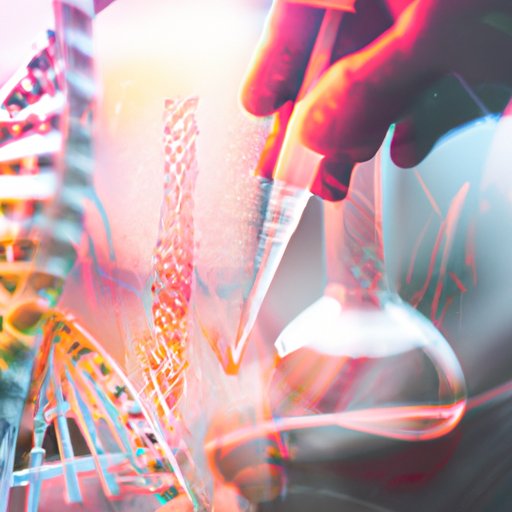Introduction
Recombinant DNA technology is a powerful tool used in biotechnology, genetic engineering and drug development. It is the process of manipulating and combining different strands of DNA to create new genetic combinations that are not found in nature. The purpose of recombinant DNA technology is to produce proteins, enzymes and other molecules that have specific properties or functions that can be used for various purposes. This article will explore the purpose of recombinant DNA technology, its role in biotechnology and medicine, and its potential risks and benefits.

Examining the Role of Recombinant DNA Technology in Biotechnology
Recombinant DNA technology has revolutionized biotechnology by allowing scientists to manipulate the genetic makeup of organisms. Through this process, scientists can create genetically modified organisms (GMOs) that have enhanced traits and characteristics. For example, scientists have used recombinant DNA technology to develop crops with increased resistance to pests, diseases, and harsh environmental conditions. Additionally, recombinant DNA technology has enabled scientists to produce proteins, enzymes, hormones, and other therapeutic products in large quantities.

Understanding the Fundamentals of Recombinant DNA Technology
The process of recombinant DNA technology begins with gene cloning. Gene cloning involves isolating a specific gene from an organism’s DNA and inserting it into a vector, such as a plasmid or bacteriophage. The vector is then introduced into a host cell, where the gene can be replicated and expressed. There are several types of recombinant DNA technology, including site-directed mutagenesis, gene targeting, and transgenic technology.
Investigating the Potential of Recombinant DNA Technology
Recombinant DNA technology has many potential benefits, such as producing large amounts of proteins, enzymes and other molecules that can be used for medical and industrial applications. Additionally, this technology can be used to create GMOs with enhanced traits and characteristics, which can help improve crop yields and reduce the need for chemical pesticides and fertilizers. However, there are also potential risks associated with recombinant DNA technology, such as the introduction of allergens or toxins into food crops, or the accidental release of genetically modified organisms into the environment.

Analyzing the Impact of Recombinant DNA Technology on Modern Medicine
Recombinant DNA technology has had a major impact on modern medicine. This technology has been used to develop drugs and treatments for a variety of diseases and conditions, such as cancer and HIV/AIDS. Additionally, this technology has enabled scientists to develop diagnostic tests that can detect and identify certain diseases and conditions. These tests are often more accurate and reliable than traditional methods.
Conclusion
Recombinant DNA technology has revolutionized biotechnology and medicine by enabling scientists to manipulate and combine different strands of DNA to create new genetic combinations. This technology has allowed scientists to produce proteins, enzymes, and other molecules in large quantities, as well as to develop GMOs with enhanced traits and characteristics. Additionally, this technology has enabled scientists to develop drugs and treatments for a variety of diseases and conditions, as well as diagnostic tests that are more accurate and reliable than traditional methods. While there are potential risks associated with recombinant DNA technology, the potential benefits far outweigh any potential risks.
(Note: Is this article not meeting your expectations? Do you have knowledge or insights to share? Unlock new opportunities and expand your reach by joining our authors team. Click Registration to join us and share your expertise with our readers.)
